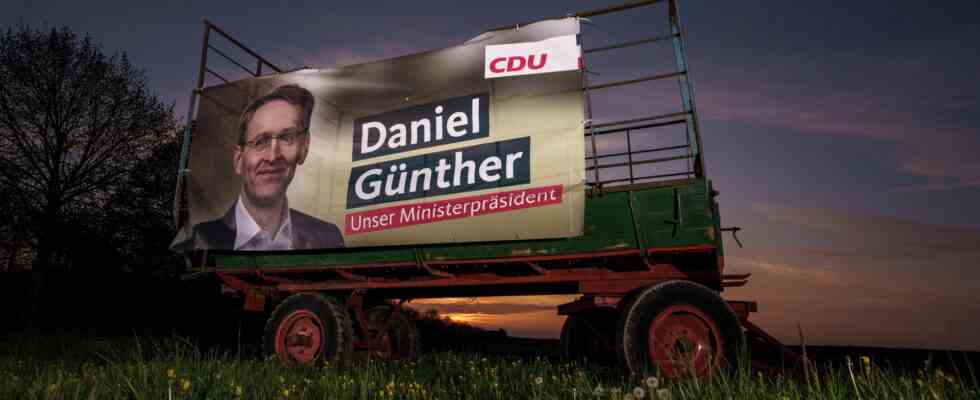analysis
Status: 05/08/2022 1:38 p.m
Highly satisfied with the government’s work, less concerned than elsewhere: Prime Minister Günther’s CDU can count on many votes in the elections in Schleswig-Holstein. That’s up to him – and indirectly also to Minister Habeck.
The political mood in the north fits perfectly with the sunny weather on this election day: in Schleswig-Holstein, people seem happier and more lenient in their judgment than in other federal states. And the problems seem to worry them less. How else can you explain that in our representative survey in the week before the state elections, 69 percent of those questioned rated the economic situation as “good” or even “very good”?
Government satisfaction higher than ever
This is well above the values recently recorded in other federal states and is astonishing in view of the pandemic and war, energy shortages and price increases. The assessment of the state government, which is currently the only Jamaica alliance in the Federal Republic, fits in with this: 75 percent are “satisfied” or “very satisfied” with their work.
For 25 years asks Infratest dimap before each state election based on how satisfied the government is – the value has never been so high. It comes about because not only the voters of the CDU, Greens and FDP are raising their fingers, but also almost three quarters of the supporters of the opposition SPD.
Mood shaped by Günther and Habeck
If you look for the reasons for this extraordinary mood, you come across two men and one topic. It’s about Prime Minister Daniel Günther, who according to his own judgment in 2017 was only an emergency nail as a candidate for his party – the CDU. And it’s about Robert Habeck, in the previous government from 2012 to 2018 Deputy Prime Minister on the coast, now Federal Minister of Economics and currently also nationwide – together with Annalena Baerbock – the most valued politician.
In the country, around 70 percent are satisfied with the Green politician and his work. They trust him to secure the energy supply for the Federal Republic in the next few years. He is still the driving force behind the Greens in Schleswig-Holstein and outshines Monika Heinold, the finance minister who is also highly regarded.
Jörg Schönenborn, ARD election expert, analyzes polls in Schleswig-Holstein
daily topics 11:15 p.m., 8.5.2022
Much praise for the Prime Minister
Habeck is even surpassed by Günther. 78 percent consider him a “good Prime Minister”. A good 70 percent of those surveyed praised the fact that he represented the interests of the federal state well in Berlin, had the ability to bring together different positions and stood for a “modern and forward-looking CDU”. That’s a dream certificate after five years in office.
And without a healthy dose of luck, he probably wouldn’t be doing so well. Schleswig-Holstein is one of the regions in which the coronavirus pandemic was mostly milder and there were fewer infected people and fewer fatalities. Günther left out the faux pas that some of his CDU colleagues made, seemed less shaky and driven, but also had an easier time on the coast.
Successful corona crisis management
As a result, 76 percent praise the state government’s good corona crisis management, while the majority in North Rhine-Westphalia and Saarland is dissatisfied. The failure of Armin Laschet as candidate for chancellor and of Tobias Hans as prime minister cannot be separated from their corona policy.
The verdict on the state government and prime minister should also be characterized by gratitude that Corona has hit Schleswig-Holstein less hard in the past two years.
Few key issues
One searches in vain for other election-decisive topics. With only 14 to 16 percent each, the respondents named climate policy, secure energy supply, rising prices and the classic of state politics: education. In the supporters of the individual parties, however, the priorities are different.
FDP voters pay most attention to schools and education. AfD supporters feel most affected by rising prices. Concern about secure energy is greatest in the Union camp, and climate policy dominates among the Greens.
Second mood test for the traffic light coalition
From a federal political point of view, the second mood test for the traffic light government is due today. While the SPD triumphed in Saarland and took over the government on its own, in Schleswig-Holstein it had to face heavy losses. Top candidate Thomas Losse-Müller remained unknown to almost half of those surveyed. He failed to set themes.
And from Berlin there is more of a headwind. 58 percent perceive the SPD policy in the federal government as “hesitant and undecided”. Only half of those surveyed believe that Olaf Scholz “is up to the task of Chancellor”. Despite recent decisions on arms sales to Ukraine, backed by a large majority in the north, he remains under pressure to explain his policies.
The problems of the new CDU chairman Friedrich Merz are no less, only receding into the background in Schleswig-Holstein in view of the strength of Prime Minister Günther.

